WARNA 942 DJ A B Shaik spent a day getting acquainted with Amirul Afiq, a beneficiary of the Goh Chok Tong Enable Fund.
Amirul was born deaf, but he has never allowed his disability to deter him from living life to the fullest. The Fund aided Amirul in purchasing a cochlear implant, which allowed him to fulfil his childhood dream of learning to drive.
You too can make a difference and support persons with disabilities like Navin by giving to the Goh Chok Tong Enable Fund at giving.sg/GCTEnableFund.
Formerly the Mediacorp Enable Fund, the Goh Chok Tong Enable Fund was renamed after its Patron, Emeritus Senior Minister Goh Chok Tong, to better reflect its roots and intent in aiding persons with disabilities to actively contribute to society and lead socially integrated lives. The Fund is administered by SG Enable, and supported by Mediacorp.
#GCTEnableFund #GohChokTongEnableFund
Richie Koh and Goh Chok Tong Enable Fund beneficiary Fengze spent the day together and bonded over their love for all things superheroes.
Diagnosed with autism and Pierre Robin Syndrome, which causes breathing difficulties, Fengze is unable to communicate verbally and requires constant care and supervision from his parents to ensure his safety.
You too can make a difference and support persons with disabilities like Navin by giving to the Goh Chok Tong Enable Fund at giving.sg/GCTEnableFund.
Formerly the Mediacorp Enable Fund, the Goh Chok Tong Enable Fund was renamed after its Patron, Emeritus Senior Minister Goh Chok Tong, to better reflect its roots and intent in aiding persons with disabilities to actively contribute to society and lead socially integrated lives. The Fund is administered by SG Enable, and supported by Mediacorp.
#GCTEnableFund #GohChokTongEnableFund
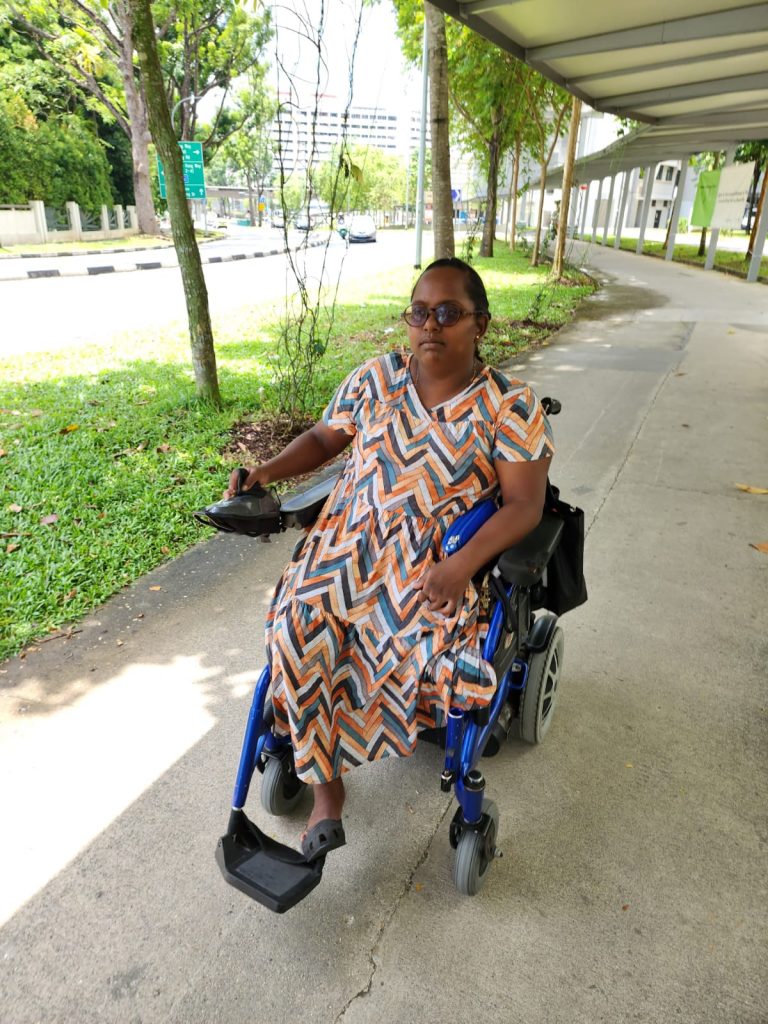
Mary Sagaya travelling on her motorised wheelchair, which she purchased with aid from the Goh Chok Tong Enable Fund (GCTEF)
Weekends are always busy for 41-year-old Executive Assistant, Mary Sagaya; like most, she spends quality time with her family either visiting various parks or going shopping. It has been six years since Mary purchased her motorised wheelchair with aid from the Goh Chok Tong Enable Fund (GCTEF), which Mary shared, has allowed her to once again travel independently.
A life full of challenges
At birth, Mary was diagnosed with Congenital Band Syndrome, a condition where tissue bands form around fingers or limbs, affecting the blood flow and growth of the joints. For Mary specifically, the syndrome caused deformation in her fingers and legs.
As a student, Mary attended a mainstream school but recalled the tough journey she underwent. “They (the other students) would tease me, call me alien and all sorts of other names,” Mary shared with a wry laugh.
However, that was the least of Mary’s concerns. Up till the age of 18, Mary had to undergo multiple operations to straighten her bent legs. Unfortunately, a nerve was severed from Mary’s last surgery, which cost her the ability to walk. Despite the setback, Mary and her family took this in their stride. Mary explained, “All my life I was constantly in pain but now, because I lost all sensation in my legs, there was no more pain.”
But that was not the last hurdle Mary had to overcome. Due to the loss of feeling in her legs, Mary was unaware when she had badly gashed the sole of her left foot on a piece of glass. The severe injury led to gangrene, leaving doctors with no choice but to amputate her left leg below the knee. Following the amputation in 2001, Mary tried adapting to life with a prosthetic leg but further complications resulted in Mary having to undergo another procedure to further amputate her left leg, this time above her knee.
The tough gets going
In the early days of adjusting to her decreased mobility, Mary refused to rely on a wheelchair to get around. She tried giving crutches a go, but found that it was too physically demanding. She became reluctant to go out despite constant encouragement from her mother.
Now, after six years of using a motorised wheelchair, Mary chuckles at her initial reluctance. “I have freedom!” Mary exclaims ecstatically while explaining her commutes on the public transport system including buses and MRT trains.
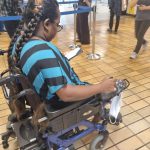
Mary commuting on the public transport system
Today, Mary commutes daily from her home in Bukit Panjang to her parent’s place in Choa Chu Kang to care for her ailing mother. Seasoned with the use of her motorised wheelchair, Mary accompanies her mother and sister for medical appointments and sends her nephew and nieces for their tuition classes.
A new-found confidence
Mary attributes her new-found confidence to her supportive workplace, Chapman Consulting Group Pte Ltd, and encouraging colleagues who are fellow wheelchair users. Mary is also grateful to the Handicaps Welfare Association for directing her to the GCTEF, which promptly assisted Mary in purchasing her motorised wheelchair. “I have to use the H word, handicapped. Really! Without it, my daily living activities would be limited.”

With her motorised wheelchair, Mary is once again able to travel confidently on her own
Taking all the obstacles she has faced in her stride, Mary is now a highly positive and confident individual.
Mary is one of over 1,000 persons with disabilities who have had their aspirations and needs met through the GCTEF. Since its inception in 2016, the GCTEF has improved the employability of another 1,000 and reached over 40,000 Singaporeans in promoting social inclusivity.
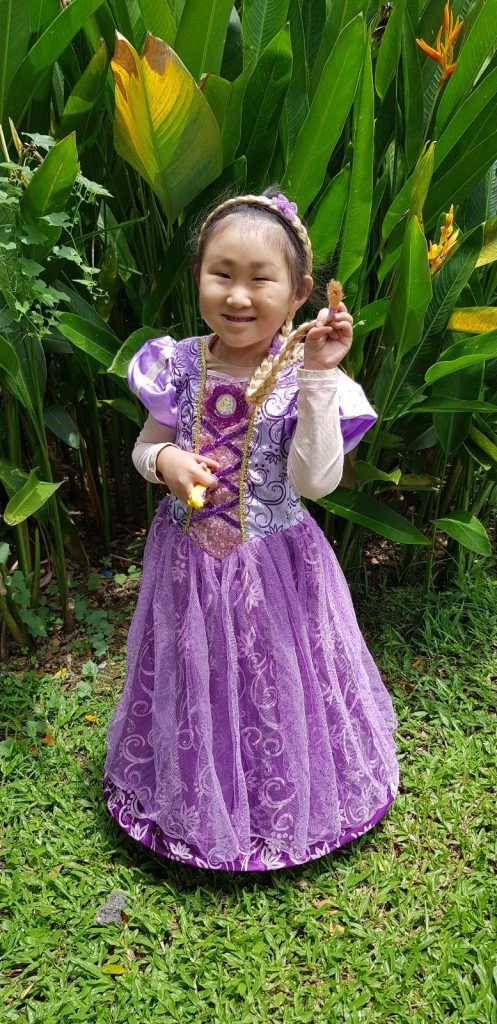
Ho Wen Xi posing in her favourite princess dress
An enthusiastic seeker of knowledge with an inquisitive mind, eight-year-old Ho Wen Xi loves learning and reading. Like most girls her age, she also enjoys getting crafting and playing dress up. However, behind that sweet smile is a story of a tenacious girl who is facing multiple health struggles.
Wen Xi was born with Fanconi Anemia (FA), a rare genetic disorder that causes physical malformations and gradual bone marrow failure. For Wen Xi, FA has affected her vision, hearing, the skeletal structure of her hands and resulted in overlapping kidneys. Wen Xi’s speech delay, another effect of FA, had also concerned her parents who decided to pick up and teach Wen Xi sign language. Goo Siew Lin, Wen Xi’s mother, recalled “After learning sign language, Wen Xi was often calmer because she now had a means to communicate with us.”.
Wen Xi’s speech breakthrough was in 2019, after she watched a performance of her favourite animated movie Frozen. “She came up to me to ask if I could buy her an Elsa (princess character in Frozen) dress. She also started singing along to Frozen songs and was subsequently chattier.” Siew Lin recalled.
Tenacity amid health challenges
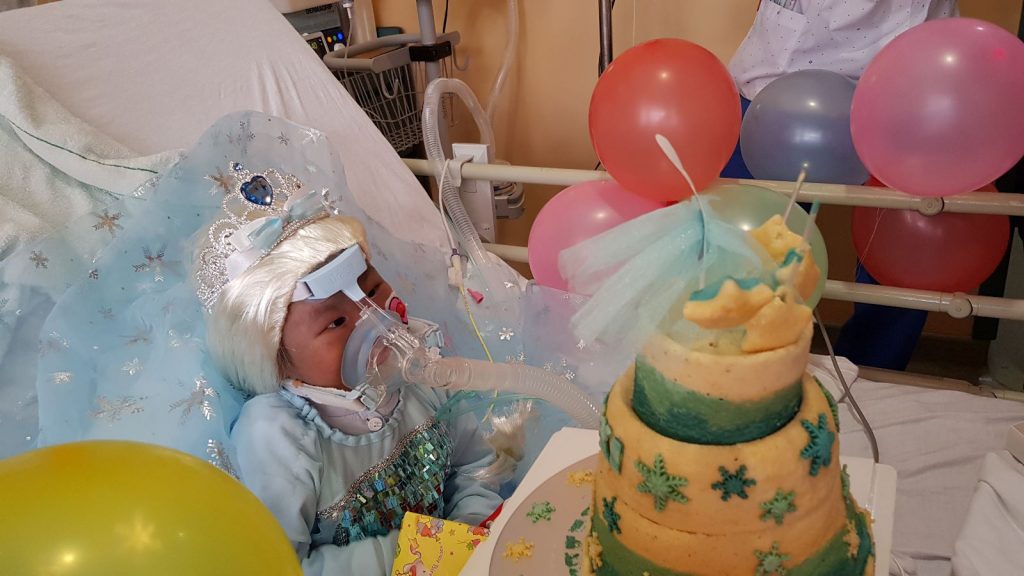
Wen Xi celebrating her fifth birthday in the hospital
Later in the same year, Wen Xi was scheduled for hand reconstruction surgery, but the doctors discovered her declining platelet count which required her to undergo a bone marrow transplant. During the six months that she was hospitalised, Wen Xi underwent multiple medical procedures.
Siew Lin recounted, “She was prepared for the procedures because she liked reading up on the human body. The nurses were surprised by her bravery, she was not scared of the needles or blood.”. With aspirations of pursuing a career in the medical field one day, Wen Xi regularly reads up about the human body.
In April 2020, Wen Xi was finally discharged from the hospital. However, she was still battling other complex medical conditions including esophageal stricture, the narrowing of the esophagus, and motor difficulties due to a bilateral hip dislocation, which required follow up treatment. She also subsequently developed cyclical vomiting syndrome (CVS), a rare condition that causes repeated episodes of vomiting and nausea.
An inquisitive knowledge seeker
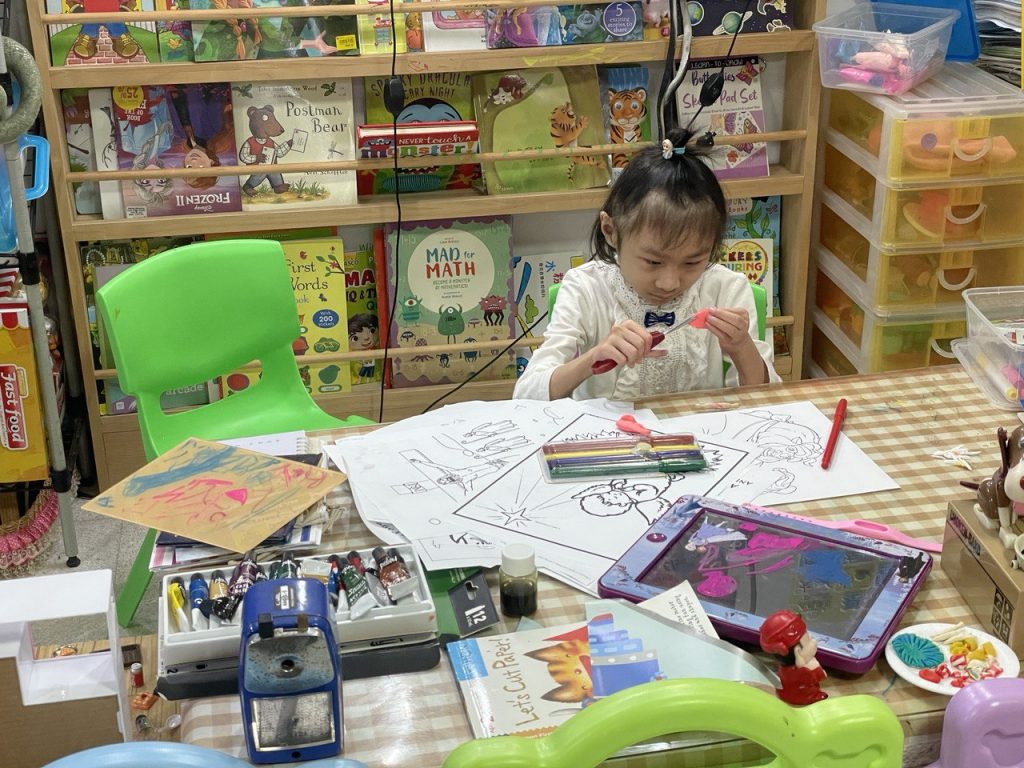
Wen Xi getting crafty, making miniature animals
“Wen Xi loves reading and learning but because of CVS, some enrichment classes turned down her applications. It breaks my heart.” Siew Lin explained.
Wen Xi also had to delay her Primary One registration twice which dampened her excitement as she was looking forward to starting school. Fulfilling her wishes, Wen Xi’s parents enrolled her in the Little Hands Bilingual-Bicultural Programme (LHBBP) run by the Singapore Association for the Deaf (SADeaf). “We are grateful that the LHBBP by SADeaf accommodated Wen Xi, and was more than willing to have her join classes when she was feeling well.” Ho Choong On, Wen Xi’s father, shared.
A Helping Hand
Recognising their situation, SADeaf referred the family to the Goh Chok Tong Enable Fund to help alleviate the transportation costs to and fro home and the National University Hospital thrice a week for Wen Xi’s medical appointments. “Due to her condition, we had to hail a taxi whenever we brought Wen Xi for her appointments. The costs added up, but the GCTEF has lightened that financial strain.” Siew Lin explained. In supporting the aspirations of persons with disabilities, the GCTEF has also covered Wen Xi’s LHBBP fees since 2022.
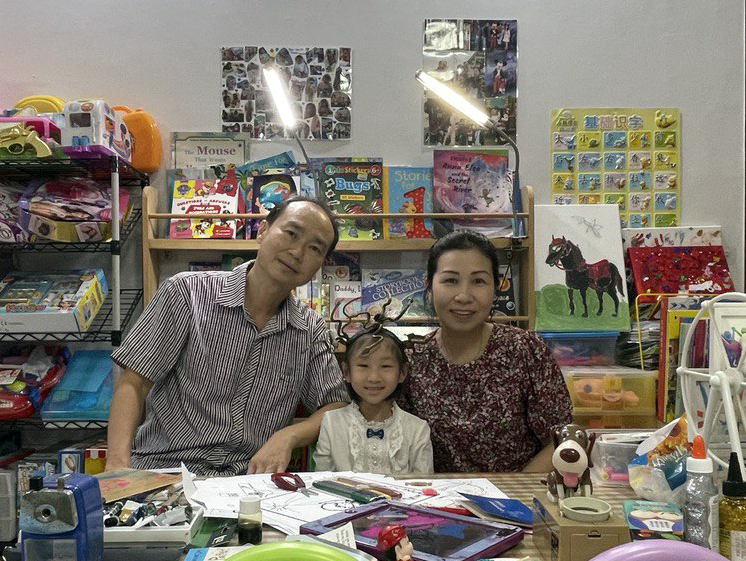
Wen Xi with her father Ho Choong On and mother Siew Lin
“When her CVS stops, we hope to treat Wen Xi’s esophageal stricture and enroll her in a mainstream school.” shared a hopeful Siew Lin.
Wen Xi is one of over 1,000 persons with disabilities who have had their aspirations and needs met through the GCTEF. Since its inception in 2016, the GCTEF has improved the employability of another 1,000 and reached over 40,000 Singaporeans in promoting social inclusivity.
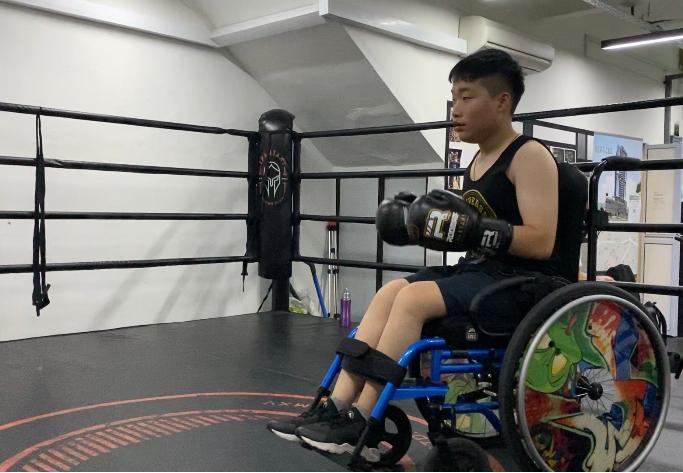
Not boxed in by disability
He swims and plays bocce. He has tried archery and horseriding. He has even given powerlifting a go. But the sport he loves best is boxing.
On his passion, 17-year-old Keith Tan says: “I have loved combat sports since young, so taking up boxing is natural for me. I find strength when I’m doing it, and it trains my mind to be sharper.”
Indeed, strength may be an important attribute for most teenage boys but for Keith, a second-year student at the Institute of Technical Education (ITE) @ Simei, it is especially significant because he has spastic diplegia cerebral palsy.
A different childhood
He was diagnosed with the neurological condition when he was one.
“As a baby, I wasn’t that active. I wasn’t rolling around or crawling. I would just lie there. My aunt was the one who first noticed it. So, my mother went to the doctor to see if this was cause for concern. The doctor then told my mum that I have cerebral palsy.”
The condition affects muscle control and coordination – it increases muscle tone such that a person’s muscles become stiff, and reflexes are exaggerated. Motor or movement milestones tend to be delayed too.
For Keith, this means that doing “even the simplest stuff” has been a challenge. He requires help for daily activities like bathing, getting dressed and visiting the toilet, and moves around in a wheelchair.
“My movements, especially waist down, are restricted. I can’t stand with both hands free. One hand has to be holding on to something for support. Speech is another thing. Sometimes my voice sounds strained because my muscles tense up.”
To help him, Keith always has a domestic helper by his side, even when he goes to school. However, he shares that having an adult supervising his every move has put a dampener on making new friends.
“I can’t be myself because there is always someone there. So, I am more guarded and that has contributed to my introverted nature. But I want to change that as I get older. I want to be more independent.”
Ticked the right boxes
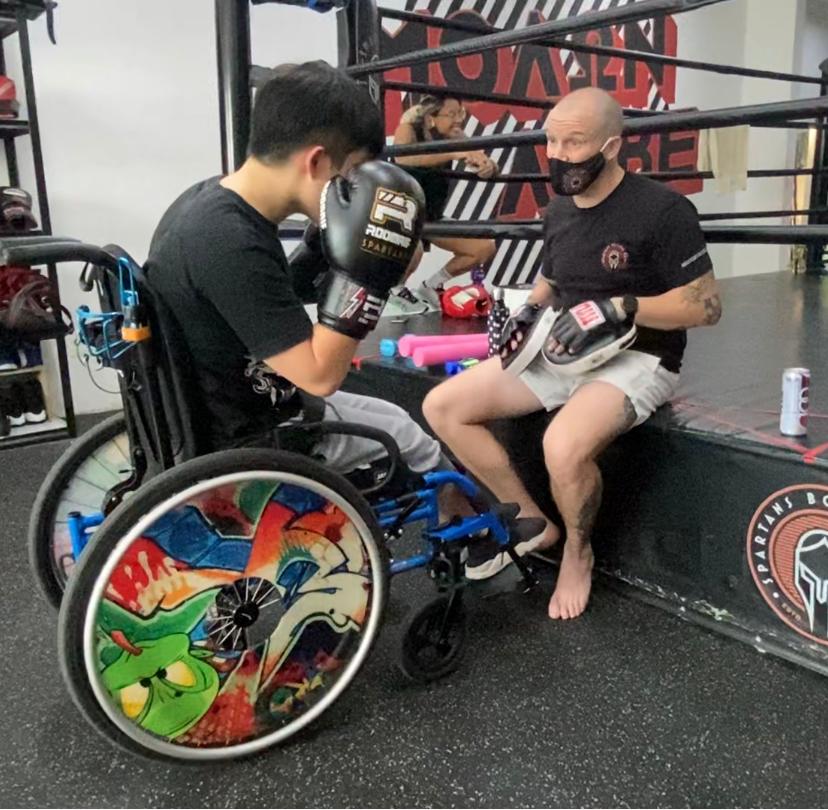
Keith having a post-session debrief with his boxing coach after his training.
In October 2019, Keith decided to take up boxing, a sport that had intrigued him for a long time.
In his search for a school that would take him in, Keith chanced upon the Spartans Boxing Club. He wrote in without much expectation, but was warmly welcomed by the owner and he soon started lessons.
However, as Keith progressed, he realised that his wheelchair was not ideal for the sport, and he needed a sturdier wheelchair that could move around better. This was tough for his single mum who works in F&B, as a new wheelchair could easily cost up to a five-figure sum.
With assistance from the Mediacorp Enable Fund, Keith was able to buy a customised wheelchair that can support him better as he spars and trains. The new wheelchair is also lighter, making it easier for Tan to manoeuvre as he goes about his daily activities.
For the aspiring programmer who intends to further his studies at a polytechnic after he graduates from ITE, boxing seems to be the sport that has ticked all the right boxes for him.
“This is something I can do for the long haul, and I am grateful to be able to receive help from MEF to buy a new wheelchair so that I can continue my passion.”
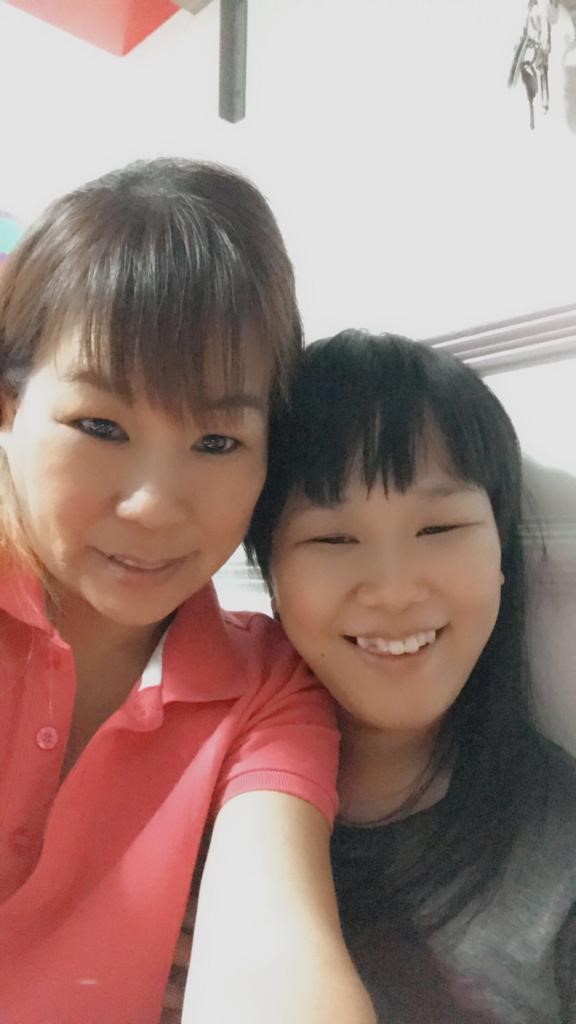
Heng Lye Nging has not had it easy. Her only child, Lina, was born with developmental delay, autism and hearing impairment, something she only confirmed when her child was three years old. Lina is now 24.
“I suspected something was wrong because she wasn’t behaving like other children. She started babbling at eight months but stopped soon after. She never learnt to walk. She didn’t play with other children,” recalled Madam Heng.
It took several visits to various hospitals before Lina’s disabilities were diagnosed. Madam Heng’s in-laws could not accept the girl’s condition and her marriage broke down soon after.
Although she was entitled to both alimony and child support after the divorce, Madam Heng never demanded either.
“If my ex-husband has money, he will give me some. If not, I don’t ask,” she said. “I only ask that he takes Lina out every weekend to spend time with her. That was my only condition.”
Left to support Lina on her own, Madam Heng began to work at coffee shops as a stall assistant, often clocking in 12- to 15-hour shifts.
“We try to make ends meet. Lina’s not picky. When I don’t have enough money, I feed her canned sardines and she is just as happy,” smiled Madam Heng.
“On her birthday, she gets to eat KFC or McDonald’s. She likes that and I buy her a little cake to celebrate. We do this only once a year. That’s all we can afford.”
Although Madam Heng did not make much, she made sure her daughter was well cared for. She hired a maid to watch over Lina when she went to work and trained the maid to care for her special needs child who, by her own admission, is not easy to manage.
“She throws temper tantrums when she can’t get her way and won’t take no for an answer. She hits people as well. The older she gets, the worse the tantrums have become. She also gets restless and refuses to sleep at night, choosing to pace the room or raid the refrigerator for food.”
As a result, they have not been able to retain their maids for long. The constant change of maids has been difficult on Lina as well.
“She will chase the new maid out of her room, refuse to eat or become violent. At times, she will vent her frustration by throwing things out of her bedroom window. I had to put a net across the window because she refused to stop,” confided Madam Heng.
Still, she says Lina can be thoughtful.
“She may not be able to dress herself, bathe herself or go to the bathroom on her own, but she knows when she is loved and she can be sensitive to my needs,” Madam Heng said.
“When I come home from work exhausted or when I am sad, she can sense it and she will give me a hug. She won’t ask me for things like she usually does.”
Mother and daughter are so close they need neither words nor sign language to communicate.
“I can sense what she wants. It’s a mother’s instinct. Sometimes, just a look is enough for me to understand her.”
Then a year ago, Madam Heng sustained a fall. She hurt her leg so badly she could not work. Without a regular income, she could not contribute to her Central Provident Fund (CPF). Without money in her CPF, she soon fell behind on the payment for her Housing Development Board (HDB) flat. She resorted to small loans from friends but it was still not enough. She faced the real risk of losing her home.
Through St Andrew’s Autism Centre’s Day Activity Centre (DAC) where Lina has been attending since 2012, Mediacorp Enable Fund (MEF) found out about Madam Heng’s plight. Aid from MEF helped Madam Heng tide through a very difficult period by financing Lina’s DAC fees, meals and transport for a one-year period.
“I am so grateful to MEF for their help. I don’t usually like to rely on others. I try not to ask my family to help us because Lina is my responsibility. I don’t expect others to take care of her,” said Madam Heng.
Asked about her hopes for Lina, Madam Heng is sober, “I live one day at a time. I don’t ask for much, just that she grows up peacefully. I don’t expect her ever to be able to work or take care of herself independently.”
10 years ago, Madam Heng made plans for the day when she is no longer around to care for her only child.
“I told my niece to sell my flat and use the money to pay for Lina to stay at a home,” said Madam Heng. “Until then, I will care for her the best that I can.”
These days, things are looking up a little. Madam Heng’s friend recommended her to a coffee shop and she is working once more.
“Lina is not be able to tell you what she wants or when she is not comfortable. All she will do is cry. As a mother, it is my job to figure out how to make her feel better. But when she is happy, she will give me a kiss.”
An independent spirit who fiercely protects and loves her child, Madam Heng may not often ask for help, but she is always thankful when people come alongside her to ensure that her daughter is continually being trained and engaged. The rest, like the glimpses of affection Lina is able to show, is a bonus.
Arising from the family’s dire financial situation, Lina’s DAC programme fee had been deviated to $100 monthly for several years. Since January 2017, the fee has been paid by a private donor as Mdm Heng is unable to manage the cost of programme fee and bus transport. Further assistance has been extended for the programme fee till March 2019. Other short-term assistance was also arranged to defray the family’s daily living expenses. The family’s financial situation has not improved. Mdm Heng foresees she will have difficulty with managing the cost of DAC and transport after March 2019.
In addition, Mdm Heng has no savings and exhausted her CPF.
In Feb 2019, MEF granted $3,000 as a last mile need, to help meet Ms Lina’s DAC programme fee and meal expense, as well as the balance bus transport cost, all amounting to $257.50 per month so as to alleviate the financial strain on the family.
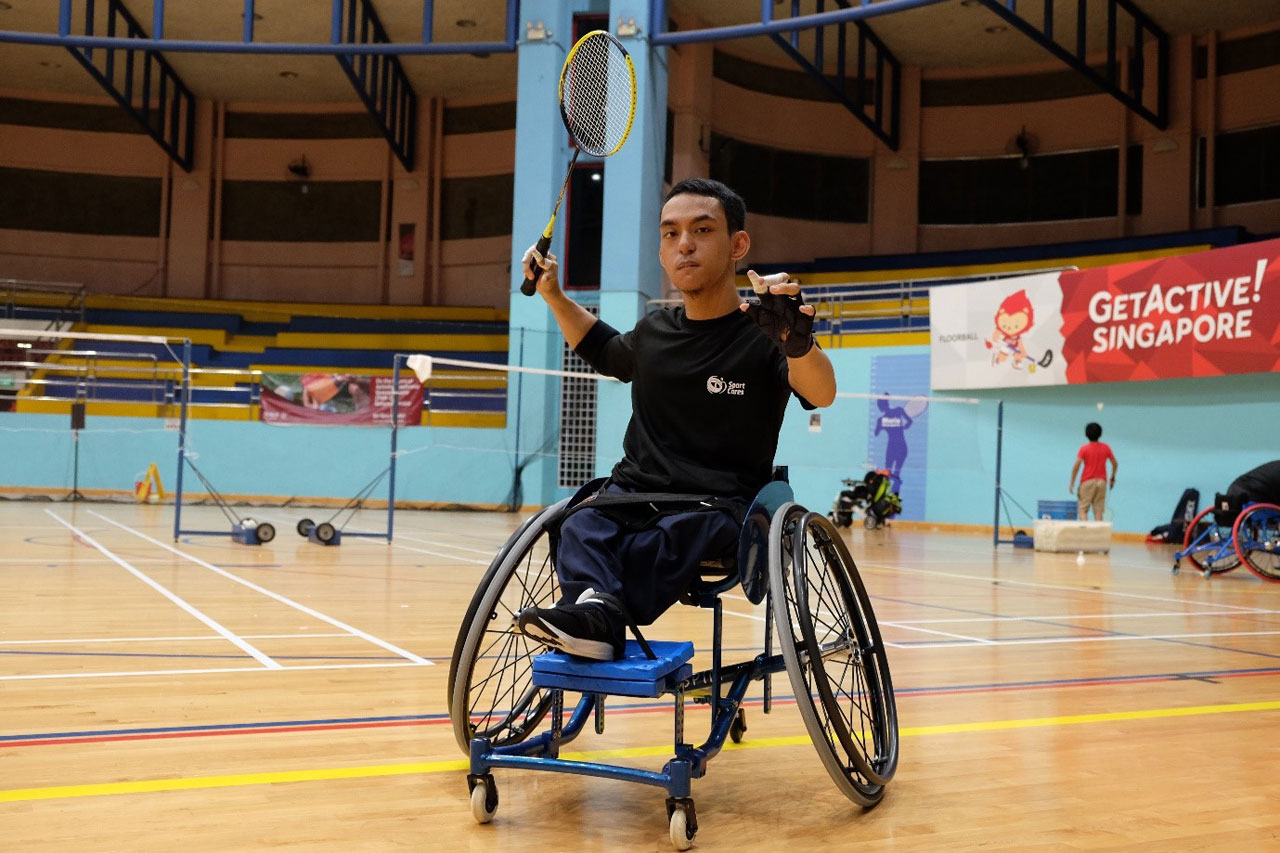
Like many children, Akram Ramadan Misrawi, 24, began playing badminton because it was something his family did.
“I started out since young because usually my family would, especially during the holidays, invite me out to play badminton for recreation, under the void deck,” recalled Akram.
It did not matter that he was born with skeletal dysplasia and that the condition affected the development of his limbs so he could neither walk nor grip things properly.
“I can’t really hold [the racket] the way normal players do for most of the shots, so I have to improvise in a way that suits my disability,” he said.
His family encouraged him anyway.
“They know how active I am, they know how I like badminton, so they asked me to try it.”
Big Dreams
Soon, fun family activity gave way to aspiration and Akram began dreaming of playing for Singapore.
“If you are competitive, you have scheduled training programmes,” he explained. “I like badminton so I want to increase my skills to more of a competitive level, instead of just hitting [the shuttlecock] around.”
In 2015, he began playing competitively. He was so good that two years later, he represented Singapore at the Asian Youth Para Games in Dubai.
Big Hurdle
But for this Nanyang Polytechnic graduate, there were limits to his aspirations. Beyond buying the usual sports equipment for badminton, he needed a special wheelchair.
“[The one I have] was more for basketball. The structure of the wheelchair is different which makes it not suitable for badminton”, Akram explained.
“If you move fast and suddenly break, you might fall over because of the weight. There were numerous times where I fell over while playing, so that’s why I decided to get a new wheelchair.”
A sports wheelchair for badminton would cost upward of $5,000, amounting to even $7,000 for a good one. It was money his family did not have.
Big Help
This is the plight of many with disabilities. It is not the lack of ability nor ambition that stops them from living out their potential and fulfilling their dreams. It is the lack of finances and opportunities. At times like these, a helping hand can go a long way.
For Akram, that helping hand came from Mediacorp Enable Fund which sponsored a new wheelchair specifically designed for para-badminton players.
“It really helped to lift the burden off our shoulders and we didn’t have to worry about paying that amount of money,” said Akram, who is the second of three children.
“The new one is a bit lighter; you can move faster. Performance-wise I am able to focus more on the game.”
Now, Akram has plans to hit the big leagues and do Singapore proud.
“My goal with this new chair is to excel in my training and to one day participate in games such as Asean [Para] Games,” he said.
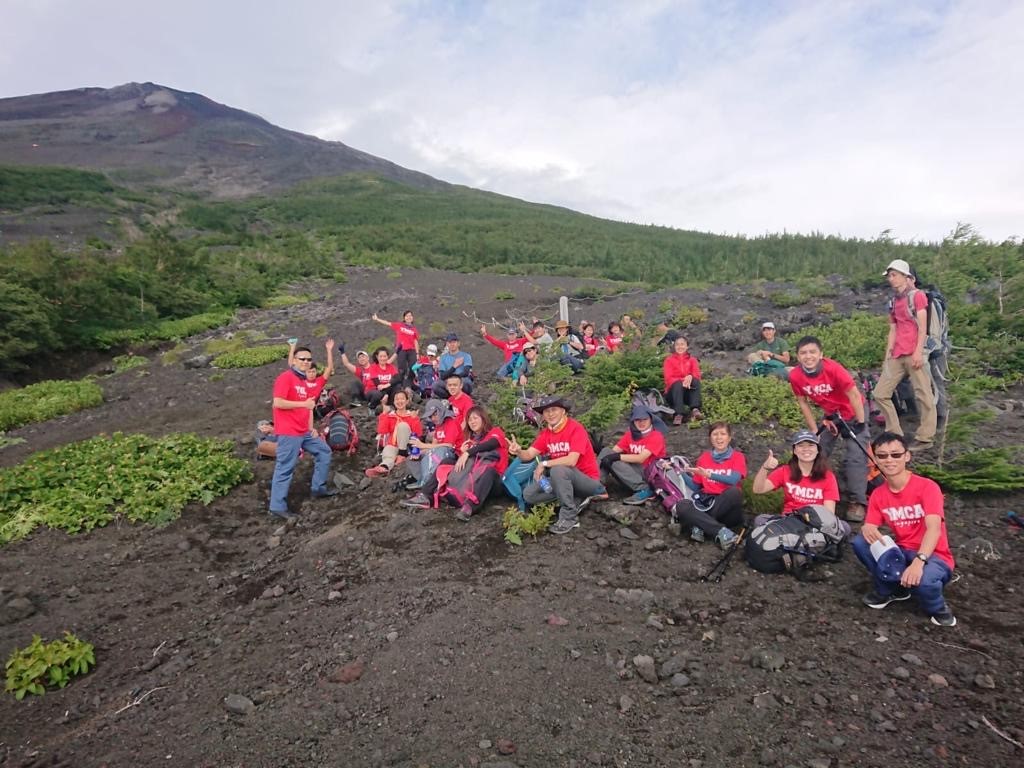
They were an unlikely team of trekkers. Some had cerebral palsy, others with autism, four were visually impaired and one needed crutches. All, however, were determined that no disability would prevent them from living life to the fullest. Empowering them to do just that was non-profit organisation YMCA Singapore.
“For the last 14 years, we have been organising Y Camp Challenge where we take people with special needs outdoors four times a year. This year, we decided to take it to another level,” said Steve Loh, General Secretary and CEO of YMCA Singapore.
Next Level Challenge
That new level was to climb Japan’s tallest peak, the nearly 4,000-metre high Mount Fuji, in August 2019. For able-bodied adventurers, that would have been an easy one-day expedition. For the 10 people with various disabilities, it would be a monumental two-day journey requiring the aid of volunteers, local guides and even a team doctor.
“We wanted something inspirational and aspirational, something that would uplift them and inspire them to reach beyond themselves,” said Mr Loh of their choice of destination.
To meet the challenge, the 24-member team trained together for three months, going for hikes regularly and even completing a vertical marathon that required them to race up 57 floors.
Added Mr Loh: “The training sessions were not purely physical. It was actually for the volunteers like us to figure out how we were going to keep up with them and the kind of help they needed.”
One of the participants, 46-year-old Chris Tan, has only five per cent of her vision left because of glaucoma which she developed in her teens.
“I definitely need a guide to be with me. My guide will be my eyes. She has to describe every single step to me, the rocks, the terrain to make sure I am able to manage the trail,” she explained.
Many also went the extra mile and trained on their own. Oh Siew May, 48, who has speech and movement difficulties because of cerebral palsy, took the stairs to get to her 25th storey apartment four times a week every week for months.
“I want to tell people that being disabled doesn’t mean we are unable. We can do everything that we want,” she said.
Next Leap Partners
Given the magnitude of such projects, organisations often cannot work alone. That is where charity funds like Mediacorp Enable Fund (MEF) are able to come in. MEF was one of the sponsors of YMCA Mt Fuji Inclusive Expedition 2019, lending both financial support and resources to help fulfil aspirations.
Actress and Mediacorp’s Gold 905 DJ Denise Tan was one of the volunteers for the climb.

“I think a world in which we help each other achieve our dreams is a better place in which to live. If you can help just one person today with your gift, it’s still worth it. It’s life-changing and it goes both ways,” said Tan.
“I was paired with Chris. We ran together to build stamina, climbed stairs and did a few practice hikes up and down Bukit Timah Hill in preparation.
They are amazing individuals. They have this can-do spirit that puts us to shame and physically, they are very, very fit. They train longer and harder than any of us abled-bodied people.”
Next Climb on the Agenda
That kind of grit certainly came in handy during the actual climb, especially when the weather was not in their favour. Heavy rains during their ascent made the rocky paths even more of a challenge.

“I did not lose motivation because in my mind I always keep telling myself how to reach to the top to get some ramen inside of me,” said Harun Rahamad who has cerebral palsy.
Bone cancer survivor James Wong, 28, shared: “In a group, everyone moves at a different pace. I couldn’t really run to catch up with the team. But I hope that the climb will raise awareness about people with disabilities, that we can do beyond what we imagine.”
In the end, the team made it to the eighth station, just a little shy of the summit of Mount Fuji. Still, it was a win. They were able to raise $200,000 for future outdoor activities for the special needs community and they proved that with gumption and good partners, few things are insurmountable.
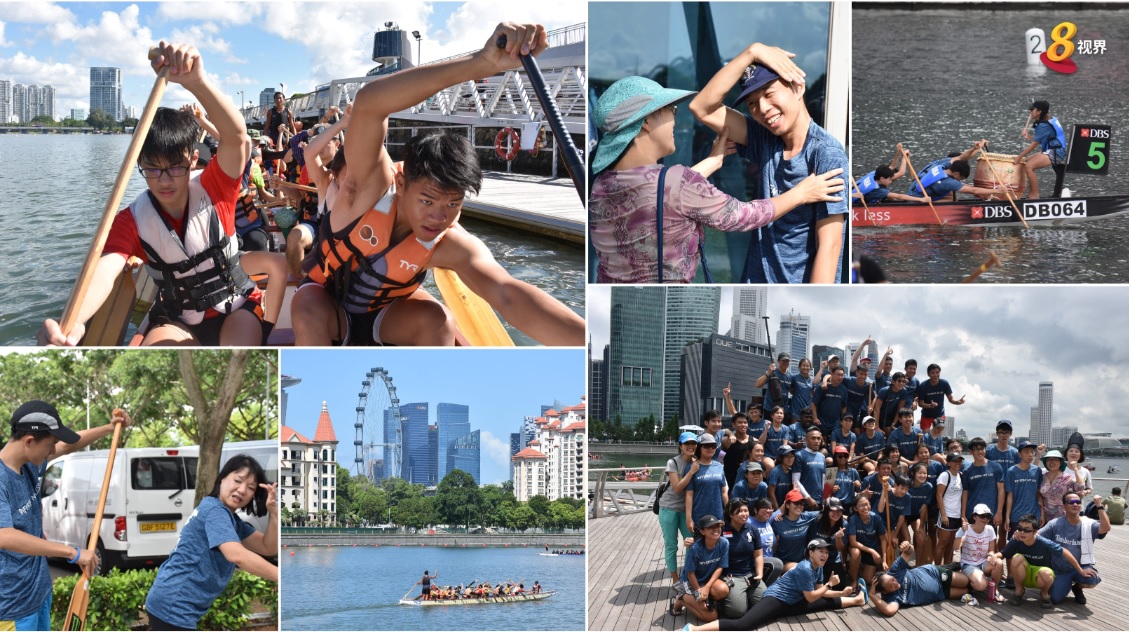
“异龙”突起!本地有这么一个由不同特殊需求的队员组成的龙舟队,他们在正式成立约半年左右便首次出征一年一度的星展银行滨海龙舟赛(DBS Marina Regatta),夺得坚韧不拔精英组公开赛的冠军!
异龙龙舟队每个星期天早上都会在新加坡体育城进行训练。上个星期天(26日),龙舟队进行了正式比赛前的最后一场训练。约40名队员和义工在烈阳下埋头进行热身运动以及短跑训练。虽然各个都汗流浃背,但他们却没有任何一点怨言。
如果不说,你或许看不出龙舟队由不同特殊需求的队员组成,当中就包括了轻微和重度的自闭症患者、失聪人士、失明人士和智障人士等。
中重度自闭症儿母亲:这是他人生中很重大的比赛!
在训练途中,其中一名队员、25岁的杨震宇突然脱掉身上的救生衣和帽子,不愿意继续下海划船。这时,他的母亲、52岁的彭维燕便在一旁轻声安抚他,“乖乖训练,我们等一下去吃东西”,并重新帮他将救生衣穿上。
彭维燕告诉8视界新闻,儿子震宇患有中重度自闭症以及过动症,智商只有37。因为觉得划龙舟是个不错的运动,同时也希望儿子能参加团队活动,所以就从去年12月开始,让他加入龙舟队。
“我跟他的爸爸提议说要让他去划龙舟,他还说‘不要啦,他肯定不可以的’。我本来也觉得会很难,可是就想说让他试试看,顶多不行就算了,可是要给他这个机会。”
划龙舟每个星期的训练都十分辛苦,非常耗体力。彭维燕说,虽然儿子不会对说些什么,但是他会通过肢体语言表达出自己的情绪。
“像今天(26日),他的情绪就不是很好,一开始做第一个热身运动做第一下就不太好了,所以就不太合作。如果他合作的话,他的笑容是很可爱的。”
彭维燕也在约三个月前开始担任龙舟队的义工,陪同儿子一起训练、划龙舟。两人的母子关系也因此增进不少。
“我们有比较多时间在一起,不管是在路上,或是在参加活动。而且划龙舟是个团队活动,比赛的氛围也很让人热血沸腾。”
对于儿子参加划龙舟比赛,彭维燕可说是又担心、又自豪。彭维燕一方面担心震宇会“拖后腿”,一方面又不敢相信自己竟然会有看到儿子参加比赛的一天。
“从他小时候诊断出患上自闭症,他从来没参加过什么比赛,因为他的能力比较弱。这个可以算是他人生中很重大的比赛,所以会紧张,会担心他拖后腿、不肯划。”
义工:他们和大家都一样
有不同特殊需求的“异龙”在训练时,身边都会有一名义工在旁协助和教导他们。陪在震宇身旁的义工是26岁的陈嬿全。她说,因为自己从未和患有自闭症的人有所交流,因此一开始和震宇一起训练时,总是会不知所措。不过经过慢慢的磨合、相互了解后,她也找到了教导震宇的方式。
“有时候我们一群人一起划船的时候,他不会一起划。我们休息的时候,可能我就会叫他再划给我看。有时候他在划船的时候会突然站起来,我就会尽量叫他坐下。”
陈嬿全和震宇接触的这几个月以来,不仅两人的关系更加融洽,她也开始了解到震宇母亲的辛苦。整个龙舟队就像是个大家庭一般。在今年的母亲节,陈嬿全也和其他义工们准备了小礼物,送给队员们的母亲,慰劳她们。
担任舵手、27岁的王辉杰也是龙舟队的一名义工。王辉杰说,自己担任义工后,也从队员们的身上学了不少东西。
“其实他们和我们一样,不要对他们有不同的偏见。他们可能有障碍,可是如果你用简单的方式跟他们沟通,其实他们都会。有些队员没有划过龙舟,可是过了10到15周,他们就可以划得很好。”
最温馨比赛 教练:对比赛成绩感到十分满意
在星期六(1日)早上,异龙龙舟队的队员们聚集在滨海湾一带,准备参加星展银行滨海龙舟赛坚韧不拔精英组公开赛的项目。队员们各个异常兴奋、笑容满面。不少家长也特地抽空陪他们参加比赛,并趁着比赛空挡加紧给孩子们进行一对一的训练。
比赛在短短的1分钟内便结束,异龙龙舟队所派出的两支队伍分别夺得第一名和第四名。
其中一名患有自闭症的队员、20岁的林佳毅说:“我很喜欢划龙舟。对于今天比赛的成绩,我感到很开心。我们整个队伍都很开心地一起比赛。”
异龙龙舟队的教练、28岁的黄衍量表示,一开始会创立异龙龙舟队,是希望能够提供一个平台,让这些特殊需求的人士也能够参与这项运动,同时也让他们的家长、看护能够有一点喘息的时间。
黄衍量对队员们在比赛中的表现感到颇为满意。
“今天的表现不错,可是当然还有可以进步的地方。好的部分是他们划得蛮齐的。我们接下来的计划是在2021年的时候参加世界竞标赛,所以我们以那为目标努力奋斗。”
异龙是社会企业Society Staples旗下的龙舟队,Society Staples 也获新传媒协立慈善基金(Mediacorp Enable Fund)的资助。
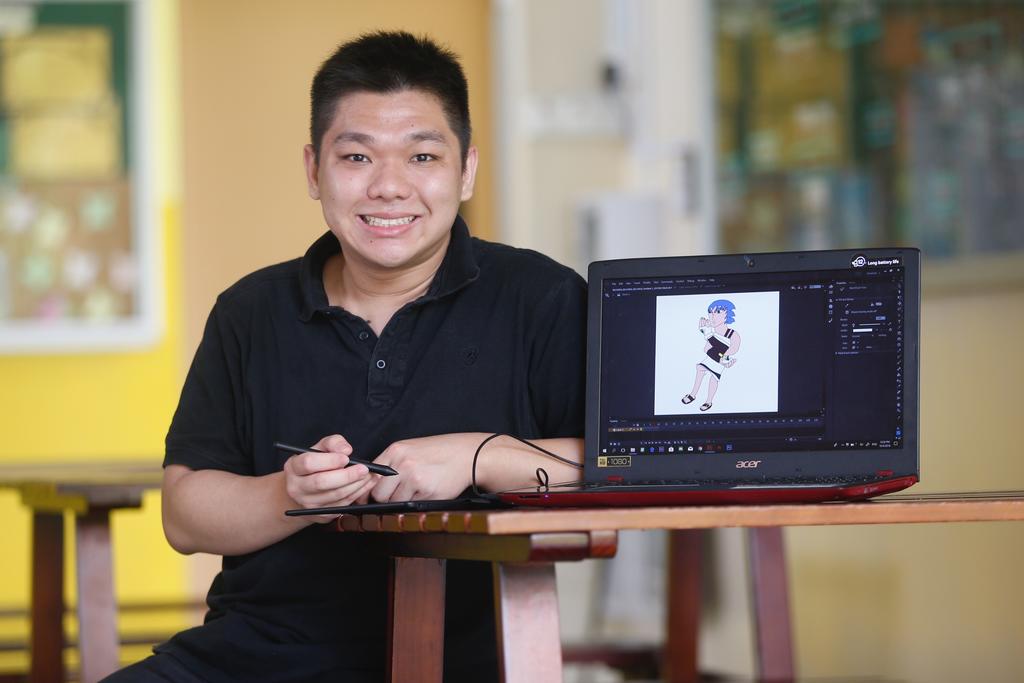
SINGAPORE — Mr Lim Han Ming’s face lights up as he talks about Kana Akira, the blue-haired hero created by the budding animator.
“The most dangerous person is the most silent,” said the 21-year-old of his anime character. However, he quickly clarified: “But he’s a good guy!
“He’s just an average joe, but when there is trouble…he’s all action, no talk.”
Perhaps sometime in the future, anime fans will get to see Kana Akira star in his own animation series, which is a goal that Mr Lim, who has mild intellectual disability, is earnestly working towards.
Since February this year, he has been attending a basic illustration course at game design institute MAGES Institute of Excellence, picking up the essentials of drawing. These include using perspective, effectively combining light and shadow in an image, and drawing the human anatomy.
Mr Lim, who works eight-hour shifts at a McDonald’s outlet in Woodlands four days a week, spends the rest of his time practising the additional tips that he picks up from watching Youtube tutorials. He draws sketches of Kana Akira on the graphic tablet that he saved up money to buy.
He also received support last October in the form of a S$3,000 grant from the TODAY Enable Fund, which helped to defray his course fees, and allow him to attend an advanced illustration course.
Diagnosed with mild intellectual disability at the age of nine, Mr Lim said his interest in animation came after he attended an ad-hoc workshop on basic animation organised by his school, the Association for Persons with Special Needs (APSN) Delta Senior School, when he was 17.
While he was trained to work in the food and beverage industry in school, he had always enjoyed drawing since he was a child.
“There were always sheets of paper lying around the house with my sketches on it,” he told TODAY.
Mr Lim credits his love for cartoons, in particular Donald Duck, for sparking his interest in drawing as he wanted to create characters that could similarly “come to life” on paper.
He also found the cartoon character’s exaggerated reactions fun to watch. “It’s so funny when he gets angry…but in real life you got to calm a person down (if that happens),” he added.
He may be a huge fan of Donald Duck, but Mr Lim’s bubbly disposition is nothing like the foul-tempered cartoon character. This despite a childhood riddled by sadness and tragedy, as he lost both parents to illness at a young age.
His mother died when he was just 10, and his father also passed away a year later in 2009. Mr Lim and his elder brother Han Long were put under the care of their paternal uncle and aunt, but his aunt died in 2012.
At Woodlands Primary School, where he was enrolled in before being transferred to Chaoyang School, he was frequently bullied by his classmates for being different.
Luckily for him, his elder brother was a pillar of support, as Han Long would skip classes to look after him if he refused to go to school. Other times, he would wait for his younger brother so that they could have dinner together.
“His brother has been a very supportive figure in his life,” said Ms Goh Wei Tin, the younger Lim’s job coach at Delta Senior School. She added that Han Long, whom Ms Goh met often during school consultation sessions, was only happy when his younger sibling was happy.
Ms Goh said Han Long, who is in his mid-20s and works as an Uber driver, is happy now that his brother has found some independence, and he encourages Mr Lim’s creative aspirations.
With the love and support from his brother, and his interest in animation, Mr Lim has come a long way from the shy teen who had trouble “regulating his emotions” and coping with stress, said Ms Goh, who was assigned to help Mr Lim about a year and a half ago.
Mr Lim was upbeat when asked about the greatest challenge he has faced so far. His answer, delivered without a hint of resentment over his troubled days as a child, was a more mundane one that many people struggle with: Time management.
However, the young man became bashful as he spoke about how Ms Goh not only helped him overcome his anxieties and come out of his shell, but got him enrolled in the illustration course at MAGES.
Ms Goh said she read about the TODAY Enable Fund in an email from SG Enable. Aware of Mr Lim’s fascination with animation, she helped him apply for it. “His financial situation was not the best…so we felt this would help him build up his interest and his confidence,” she said.
With the skills picked up from the course, Mr Lim dreams of getting an internship, or a job at Lucasfilm one day.
He learnt about the American animation studio, famed for their Star Wars movies, after watching a news report about the company opening its Singapore office at Fusionopolis.
“It’s so cool,” he said of the Clone Wars, an animated spin-off from the Star Wars movies. “And it’s not just the animation…it’s the story-telling.”
If he had his way, there is one thing he would fix in the series, as he added: “The fight scenes are too slow!”
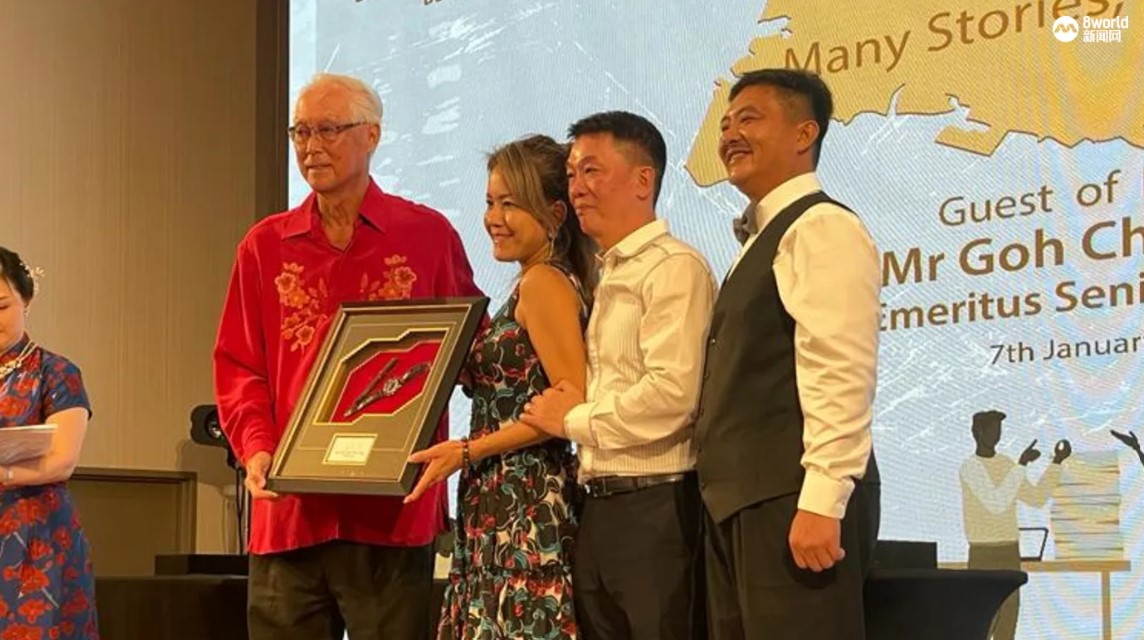
庆祝生日不忘做慈善!潮安会馆候任主席张学彬昨天(7日)庆祝46岁生日,特地举办一场盛大生日晚宴,为吴作栋协立慈善基金筹款,并邀得荣誉国务资政吴作栋担任主宾,整个晚宴总共为协立慈善基金筹得近250万元善款。 其中,吴作栋也捐出自己的手表和钢笔供竞标,两样物品最终以26万元的高价拍出,得标的是Epl Alliance Pte Ltd公司。 而印有吴作栋、社会及家庭发展部高级政务次长蔡瑞隆、国会议员陈佩玲、林谋泉和阀贺米的掌印纪念品,则拍得33万3333元3角3分的高价,由商人朱志强夫妇标得。 46岁的张学彬,是优联燃气控股的总裁,活跃于多个会馆社团。配合他的生日,他昨晚在醉花林俱乐部礼堂举办这场名为“实现梦想”(Enabling Dreams)的慈善晚宴。出席者除上述多个政要议员外、还包括企业家、商界领袖等“重量级”人物。 协立慈善基金至今发放逾500万元助残障人士 张学彬接受《8视界新闻网》访问时说,昨晚的晚宴对他来说,意义非凡。他说,其实庆生是次要,更重要的是想要做一场慈善筹款活动。 “我觉得,社会上还有一些不幸群体,需要我们去帮助。生日年年有,但不是说,年年都可以去办慈善活动。很幸运的,大家都很疼爱我,一叫就来了。” 张学彬说,昨晚筹到的所有善款,都将捐给吴作栋协立慈善基金,希望尽可能帮助到更多的有需要群体。 吴作栋在致辞时说,吴作栋协立慈善基金至今已发放超过500万元协助残障人士,他希望该基金是可持续性的,以便能继续为残障人士得生活带来积极得影响。 昨晚的庆生慈善活动,共进行长达四个小时,分别举行多场的慈善义标项目,在场的仁人善翁、商界人士都非常踊跃参与捐款,整个慈善晚宴最终共筹得243万8888元。 吴作栋协立慈善基金受惠者,昨晚在晚宴上也带来多项余兴节目,使得晚宴热闹精彩。 吴作栋协立慈善基金旨在为残障人士提供对社会做出贡献和融入社会的机会。基金由新协立管理,新传媒鼎力支持。荣誉国务资政吴作栋是基金的赞助人。欲通过吴作栋协立慈善基金给予残障人士支持, 请浏览 GCTEnableFund.sg。 文: 8 world 叶衍娴
Read More
987 DJ Sonia Chew spent a day getting to know Joan Hung, a Goh Chok Tong Enable Awards 2021 Promise Awardee. Joan was born with visual impairment, but that has not stopped her from pursuing her passion for sports. She has represented Singapore in Goalball in the ASEAN Para Games in 2015 and 2022, […]
Read More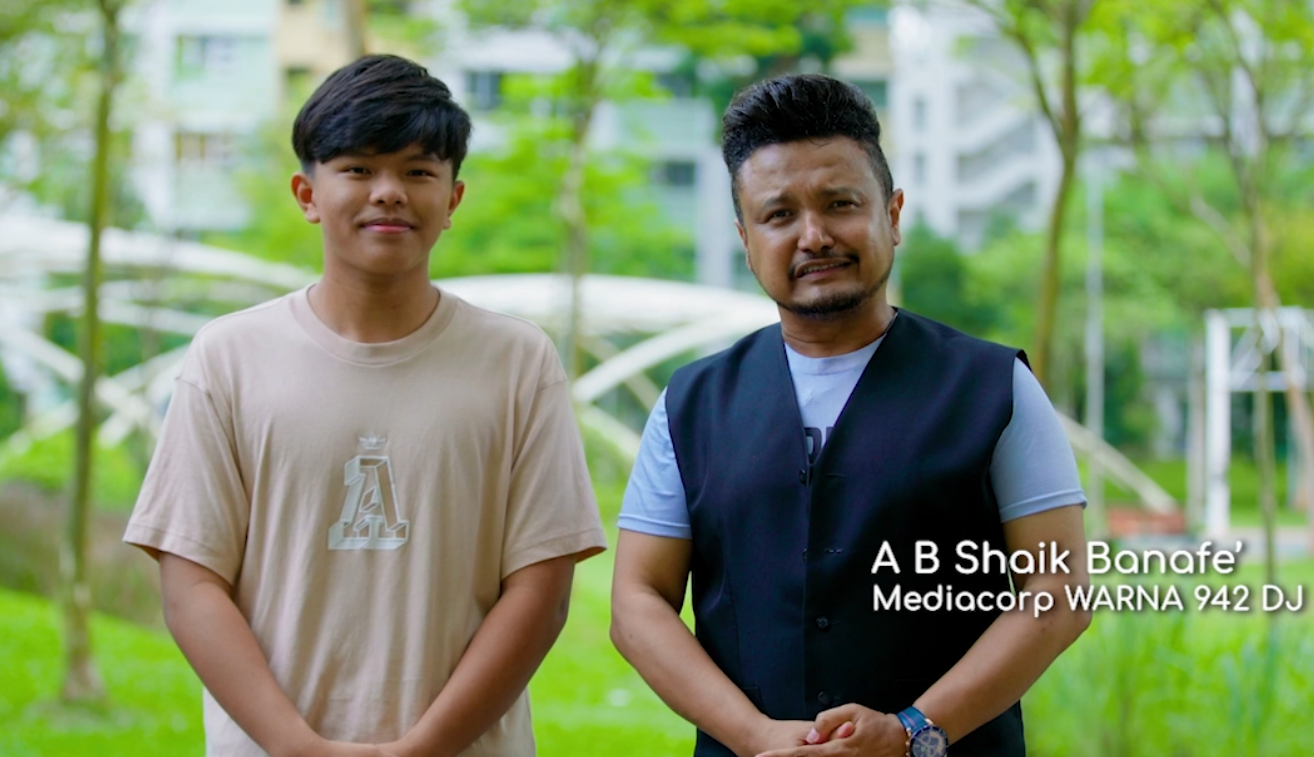
WARNA 942 DJ A B Shaik spent a day getting acquainted with Amirul Afiq, a beneficiary of the Goh Chok Tong Enable Fund. Amirul was born deaf, but he has never allowed his disability to deter him from living life to the fullest. The Fund aided Amirul in purchasing a cochlear implant, which allowed […]
Read More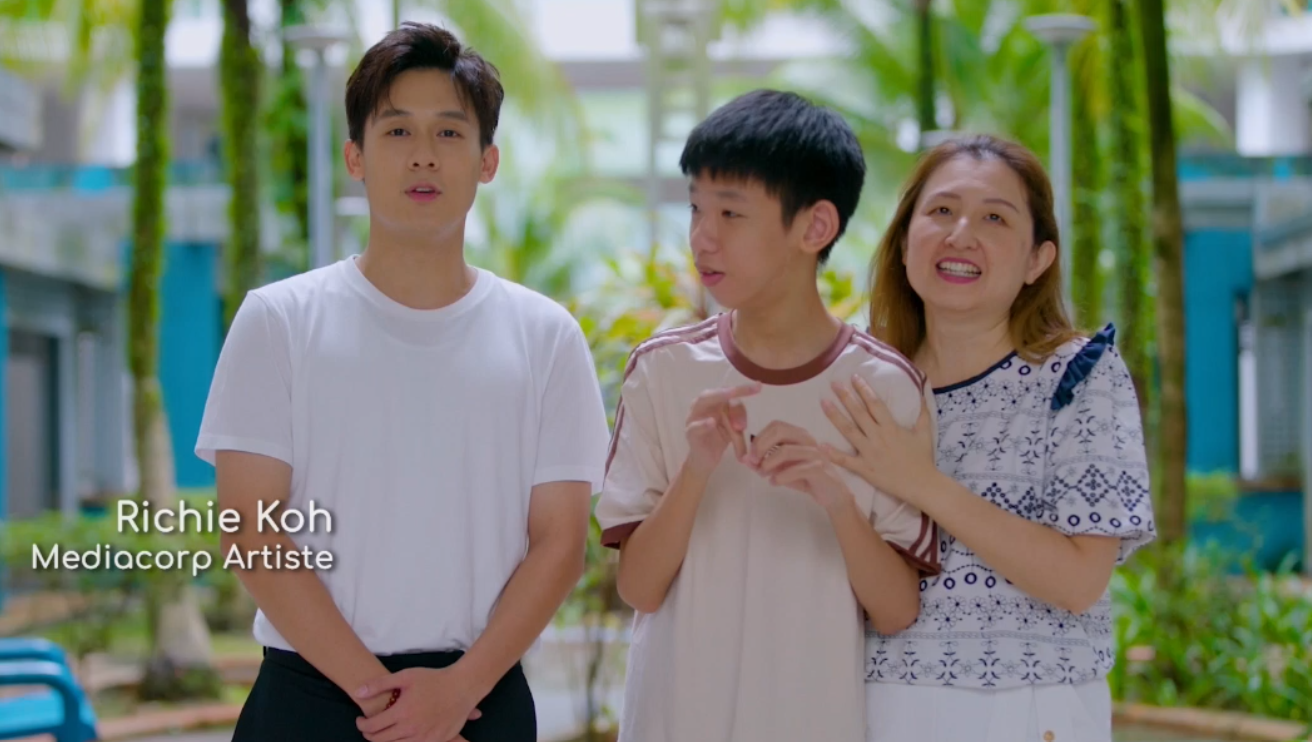
Richie Koh and Goh Chok Tong Enable Fund beneficiary Fengze spent the day together and bonded over their love for all things superheroes. Diagnosed with autism and Pierre Robin Syndrome, which causes breathing difficulties, Fengze is unable to communicate verbally and requires constant care and supervision from his parents to ensure his safety. You […]
Read More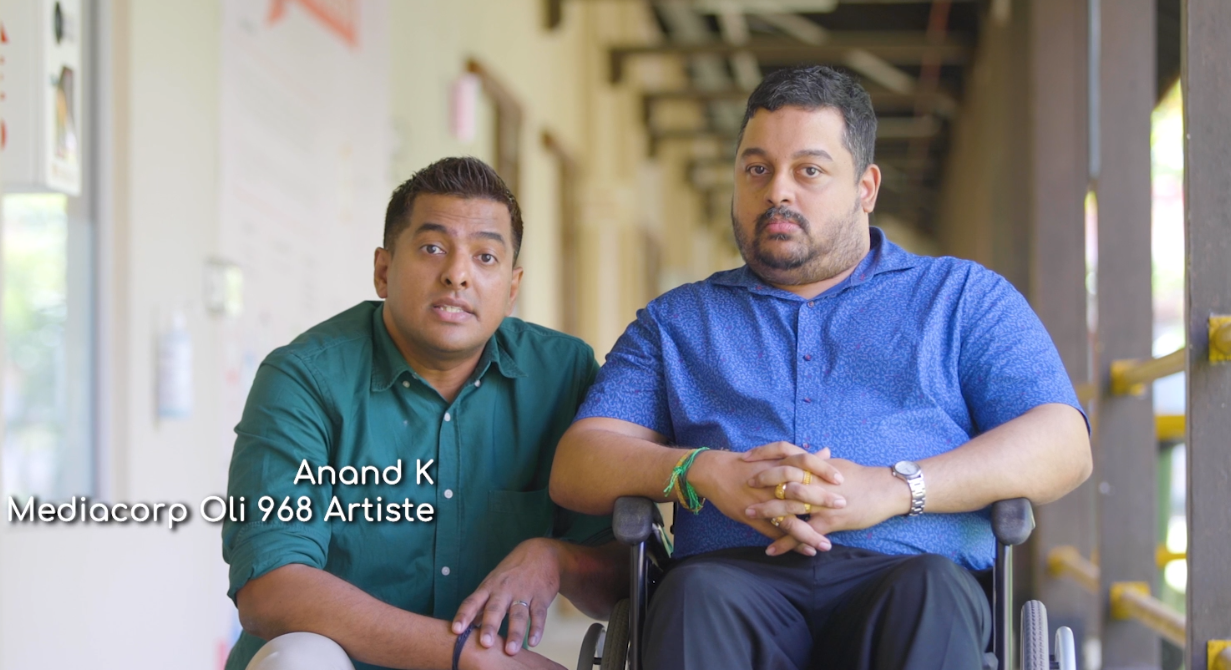
Oli 968 artiste Anand K spent a day with Dr Navin Nair, Goh Chok Tong Enable Awards 2022 Promise Awardee, who was diagnosed with cerebral palsy at birth. He became a force for good, working with the Land Transport Authority and SMRT in their efforts to support persons with disabilities in navigating the public […]
Read More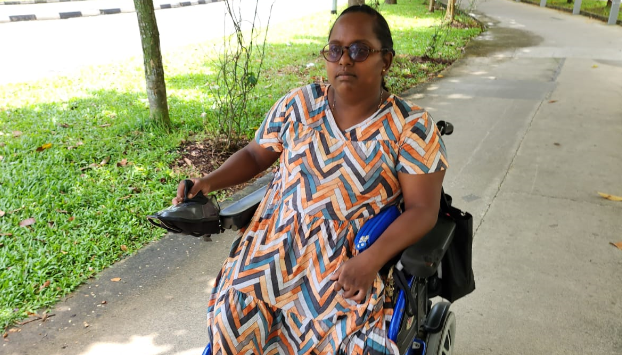
Weekends are always busy for 41-year-old Executive Assistant, Mary Sagaya; like most, she spends quality time with her family either visiting various parks or going shopping. It has been six years since Mary purchased her motorised wheelchair with aid from the Goh Chok Tong Enable Fund (GCTEF), which Mary shared, has allowed her to once […]
Read More